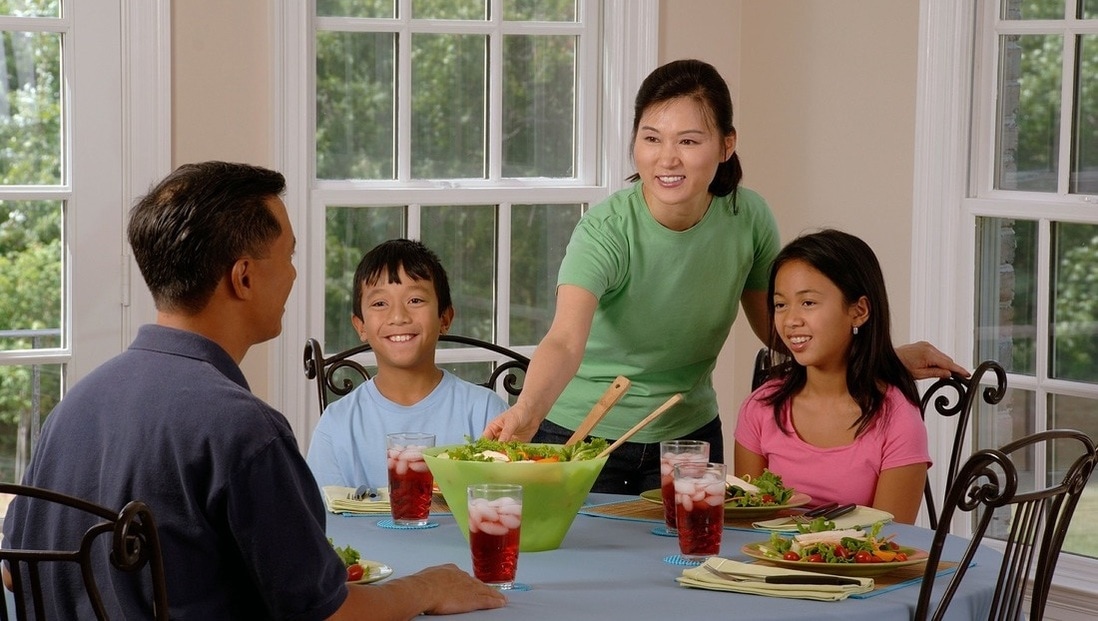Thanh Phan, MA, our Psychology Intern from William James College, helps launch the Asian Mental Health Concentration
Acculturation:
|
Mentoring: Thanh has been mentored by Dr. Catherine Vuky, PhD, the Director of the Asian Mental Health Concentration at William James who is also a staff psychologist at The South Cove Community Health Center in Boston. Dr. Vuky and Thanh make a great duo. It is easy to see why Thanh has such a sense of hope for the future of the AMHC. That future burns so brightly in the eyes of Dr. Vuky every day and is only matched by her warm smile and sense of commitment to her work. I am glad to see that they both have so much energy. The road ahead is long-so the company you keep makes all the difference. |
Please click on the following Links for more information:
Your child's eating is important/ |
"Focus on healthy eating in your home... these healthy habits will follow your | The habits we develop early in life are likely to stick with us throughout our lifespan. This is why it’s important to teach our children right from wrong, daily life skills, appropriate ways to socialize, and a multitude of other skills to help encourage our children to develop healthy adult habits. One skill that tends to get overlooked in families is healthy nutrition habits. Often, when our children are younger, our main goal is to encourage them to eat anything, rather than focusing on the timing and quality of their meals. This is an injustice to our children in various ways. Not only are we neglecting to establish healthy eating patterns in terms of choosing and enjoying healthy foods, but we are also neglecting to teach our children appropriate structure and patterns regarding their eating. Parents can only control what is going on in their home not their neighbor’s homes, therefore, it’s important to model and set these patterns in a realistic way. The end goal is to allow children to generalize these patterns to additional settings without the help of their parents. |
Vocabulary is important... | Introduction to Healthy Foods: Let’s start with their introduction to healthy foods. It is important to remember that we develop the majority of our interests at a young age. This is why parents tend to introduce children to certain sports, activities and books during childhood. The same concept is applicable for food. If parents introduce fruits, vegetables, proteins and grains at a young age, these foods become “normal” and we develop a pattern of enjoyment and acceptance of these foods. Younger children learn the majority of habits through watching others; this process is referred to as social learning. This means that children are constantly watching parents and other adults in order to develop a framework for how to live in the world around them. Therefore, if parents are modeling healthy eating habits, children are likely to follow suit. Sometimes parents are unaware of how closely children scrutinize their eating habits as well as the food s that they eat. There are other options available to model healthy eating habits such as taking your children to the grocery store with you, exploring and learning about new and healthy foods and how to incorporate certain nutrients into your meals, and learning to cook to make meals fun and part of a creative process.. On the other hand, if parents choose to place sugar and various junk foods completely off limits, their children may learn to crave these foods and overindulge in them, i.e., binging on them. They become taboo. Sometimes the pendulum swings too far and extremes aren’t usually realistic to incorporate into everyday life. This is why the concept of balance is most important to healthy eating which is often the case in most other areas of life. Vocabulary is important. Parents should help children understand which foods are healthy “go-to foods,” and those that are considered “snacks.” An active dialogue and ongoing information opportunities builds a child’s knowledge-base of healthy eating. Micromanaging and controlling everything your child eats is simply not okay and is likely to prompt them to build up a sense of resentment and anger. Over time once they have learned realistic and balanced ways to incorporate all foods into their diets, they are less likely to overindulge when left alone. In essence they have incorporated your values around food, and in the end that is what most parents want their kids to do. |
"If we aren’t getting adequate nutrients we can feel lethargic, depressed, anxious or easily agitated" | How Nutrition Affects Mental Health: So, how does healthy nutrition affect our mental health? There are lots of ways nutrition affects our mental health, specifically relating to the way nutrition can affect our brain. Certain nutrients, or lack of nutrients, can either help or hinder the way our brain is working in terms of our energy and our mental capacity to focus.
Therefore, if we aren’t getting adequate nutrients we can feel lethargic, depressed, anxious or easily agitated. Alternatively, if we are getting the proper nutrients throughout the day we are likely to feel energized, motivated and calm. All of these symptoms can be amplified for the better or worse once they are combined with life’s many ups and downs. |
"Eating routines and structure are important." | Structure and Routine: The next important aspect of nutrition is structure and pattern. Life is hectic and for most parents it is difficult to have structured meals on a daily basis. Sometimes parents squeeze in a meal whenever people are home or in between activities. Developing unhealthy eating patterns teach children that eating is not a priority, nor does it require a lot of attention. Under such conditions children learn to avoid planning meals and eating them at set times during the day. As they mature, children can become adults who value nutrition and consistency and appreciate the impact of their nutritional choices on their energy levels and overall health. |
"Role-model how to eat a meal at a reasonable pace." | Nutrition Labels and Meal Pacing: One area of detail that many parents forget is the simple process of modelling how to read nutrition labels in the grocery store. By doing so, we can teach our children how the many details associated with healthy nutrition are easily identified by a quick look. Research has shown that awareness of the overall number of calories in a given food portion can impact a child’s decision to eat it if he/she is aware of how much effort it would take to burn off those calories by walking, running, or biking. Be sure to role-model how to eat a meal at a reasonable pace. Enjoy that first portion of food, relax and chat a bit while eating, and then ask yourself, “Am I still hungry?’ If the answer is yes, then it is okay to have another portion. Remember it takes our stomach about 20 minutes to tell our brain we are full. When we are eating too quickly, we don’t realize we are full until it is too late, therefore, causing overeating. One piece of advice to address this issue at meal time would be to have kids start eating their meal, then introduce a topic for discussion to slow down the eating process. Questions about the school day, a news event, or “high-lows” of the day are generally helpful. After a conversation you can ask your child if he she is still hungry? |
"Mindful eating incorporates the five senses; smell, taste, sound, touch and sight." | The Mindful Meal: Every parent has heard the term “Mindfulness,” but have often been confused about how to apply this concept to life-events. A main component of anxiety reduction treatment is “mindfulness” work. This treatment modality speaks to the notion that as a society we are constantly multitasking and not fully immersing ourselves into what we are doing at any given moment, thus, overwhelming our minds and leading to anxiety and stress. A portion of mindfulness work incorporates mindful eating. As a family, it is important to strive for “The Mindful Meal”. This involves setting aside planned time and concentrating on just the action of eating our meals, without the distraction of any other tasks. Mindful eating also incorporates the five senses; smell, taste, sound, touch and sight. These can all be incorporated by using them as a framework for a discussion around the meal such as:
All of these concepts of mindful eating help train our minds and bodies to be present and calm. When your children and your family is more stress free, you are able to talk amongst yourselves about other things, thus facilitating healthy meals times and healthy discussion within the family. |
References:
http://www.abc.net.au/parenting/articles/nutrition_toolkit.htm
http://www.mentalhealth.org.uk/help-information/mental-health-a-z/d/diet/
http://www.nchpad.org/606/2558/Food~and~Your~Mood~~Nutrition~and~Mental~Health
http://www.livestrong.com/article/480254-how-long-does-it-take-your-brain-to-register-that-the-stomach-is-full/
http://life.gaiam.com/article/zen-your-diet
http://tribecanutrition.com/2013/05/healthy-snacks-around-the-clock-or-structured-meals/
http://www.everydayhealth.com/anxiety-pictures/anxiety-foods-that-help-foods-that-hurt-0118.aspx#10
Categories
All
1 David A. Perna
2 Caitlyn Chappell
Adolescent Psychology
Anger Management
Borderline Personality Disorder
Executive Function
Healthy Lifestyles
Social Media
Technology
Your Child
Youth Violence

















